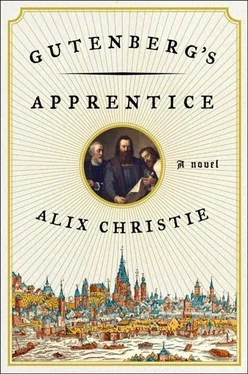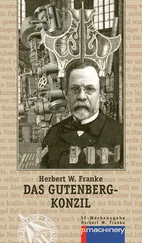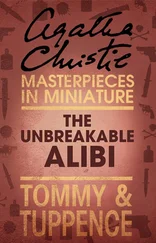“My press,” said Gutenberg. He stood there for an instant, fiddling with his beard, watching their eyes. The man called Konrad slathered a black paste onto a block of metal that on closer view was seen to be a half dozen lines of letters, bound securely with a length of twine. He laid a sheet of paper over these, and then a light wood frame containing a stretched length of vellum. He grunted as he shoved the whole tray underneath the dangling block. Fust winked, and Peter finally exhaled. He’d been holding his breath since he’d first stepped into that pit.
Konrad grabbed the lever and yanked it full across the press. This action dropped the heavy weight onto the tray. There was a thud, and then a crashing, grinding sound; Peter felt the impact in his bowels. The process was repeated in reverse; the master spat into his hands and wiped them clean, then took the paper as the pressman peeled it from the letters. He frowned, mouth working; Peter peered over his shoulder as he turned. The text was clearly crooked. “Blind buggers,” Gutenberg muttered as he strode toward the workbench by the forge. Peter and Fust, forgotten, trailed behind. Despite himself, the scribe felt a stir of interest.
Amid a mess of crucibles and cupels on the bench stood a wooden box, and next to this a row of long brass letter punches. These were the same as those used by bookbinders to press letters into leather spines. Square-cast metal hunks were scattered randomly around.
“We use a mold.” Gutenberg stalked past the table. “An idiot could do it. Show them, Hans.” He went on toward the window and left them waiting for the older man. The smith plucked up a piece of metal, held it out to Peter between burned, misshapen nails. He was a wizened thing, all bent and brown. “I hear you know some’at of scripts,” he said, his eyes so hooded they were hardly more than slits. Peter nodded as he took it, weighed its heft: as thick as his own index finger, and roughly half as long. It bore the letter a , protruding in relief upon its tip, and had been cast out of some dense silver metal. He jiggled it and frowned.
“We cast ’em in the box.” The old smith gestured at the flat, hinged casket. A basic mold, like those that Peter’d seen in Uncle Jakob’s shop — filled with fine sand that held an object’s shape for a brief time. Jewelers used them to make brooches, ring heads, and seals that later they would fix to pins or bands. And now they used them to make letters out of metal.
Peter went around the bench and saw more letters — dozens, scores, all dully gleaming. A pile of a ’s and u ’s and m ’s, each one identical. He blanched and crossed his arms to hide his hands, afraid that they might tremble. He felt a dizziness, as if the ground had dropped away. Noise battered at his ears: he heard the furnace roar, the crude press crash, as if to rend in two the very fabric of the world.
Gutenberg was standing in the mottled light of a small, dirty window, holding up the freshly printed sheet. Fust prodded Peter, and they gingerly approached. The man was frowning, fingers twisting at his lower lip. Though weak, the sun’s rays lit up every smear and imperfection. “Blind me,” he repeated, shaking his strange, hoary head, scowling as the two of them approached.
Suddenly there was a gleam in his dark eyes. “You.” His head jerked. “You there, young scribe.” A thin, cruel smile flickered. “Let’s see what you advise.”
Peter saw the smiths exchange a sidelong look. He took the paper sheet. The ink gave off a sweetish smell; he felt the strange raised welts the press had left on its reverse. He took a breath, willed his hands still, and held it up to focus on the printed lines.
Which should he say — the truth or polite falsehood? He felt his father shifting at his side. He dipped the paper slightly, looked the bastard in the eyes. “Not bad. The letterforms are strong. Though I would say a bit too rounded.” He was a master scribe — he would not hide. “A thinner form, with finer spurs, might be more pleasing.”
“Not bad!” The master’s laugh was caustic. He looked with hard, forced mirth around the room. “We forge these bloody letters in a metal he has never seen, and all that he can say is it’s not bad!” When those dark eyes returned to Peter’s face, he felt his neck hairs raise.
“What else then, boy?”
“I did not come here to find fault.”
“Why not? If it’s your trade?”
All guilds put trainees on the spot. The goldsmiths made up coins as false as any the dishonest man might pass. The jewelers gave them gemstones made of paste that shattered underneath their knives. Peter glanced at Fust; his father gave the barest nod. Warily he raised the sheet again. He let his eyes unfix, groping with his inner vision for the larger, more aesthetic shape. The whole displayed a lumpiness, a lack of grace.
“The ink is pale in parts, too dark in others.”
“Exactly right.” The master snatched it back. “It is a Calvary, God knows, to file and plane each bugger so it stands at the same height.”
He’d passed. Peter felt a little stab of pride — then horror. For from the workbench he could hear the loudest silence. He cast a smile, apologetic, toward the smiths. Too late: they both looked sour. Keffer — it was Heinrich Keffer, after all, all grown up now and burly — scratched his yellow beard and raised one eyebrow. The old one, Hans, was scowling. Peter’s stomach turned. He looked back at their master, staring at the sheet still, mouth drawn down. What kind of man was this — what kind of master? — who treated his own men no better than a pair of senseless tools?
His father’s voice came low in Peter’s ear. “I’d be obliged if you would come. We’ve still some business to discuss.” And so they left the shed and trooped into a little room in the main house that Peter took to be the master’s study. The hearth was piled with ashes from the winter past; heaps of paper on the table had been shoved aside to make room for plates. The room was chill, the furnishings unvarnished and crude.
“You see how I have spent it all,” their host said, waving carelessly about. Indeed, the home hardly seemed to be one of means. Yet they ate well and drank a quantity of Spätburgunder. Perhaps what lacked was just a woman’s touch, Peter thought with a little nod to Grede. There seemed to be no wife nor kin: Frau Beildeck, wife of the manservant, was as rough and chapped as any fishwife.
“I was rich once.” Their host was more expansive once he’d downed a jug or two. “But as you see, I spent it all — and more I’ve begged from here and there these thirty years.” He turned amused, sharp eyes on Peter. “I’d plundered all my kin before your father came — some more than once — to carry on this work.”
“It is an honor,” Fust said, “to be sure.” He took a square of linen from his vest and blotted at his lips. The only question in his mind, he said, was which book they should print first.
“I’m sure the scribe has some idea.” The master’s tone, though dry, was far less cutting than before. He drained his cup and slapped it down. “The training fee is ten guilders every annum.”
Johann Fust — smoothly, oh so smoothly — smiled. If he was startled, he did not let on. He only chuckled. “You wouldn’t ask for payment now, Herr Gensfleisch? Not after everything I’ve lent?”
“Gutenberg. I go by Gutenberg.” The printer glowered, started speaking once or twice, thought better of it. Finally it burst out. “You moneymen! You’re all alike. There’s nothing you won’t trade or give a price. Yet if a poor man tries to sell his skill, you balk.” He spread his hands in a queer parody of supplication. “You seem to think a man should give up his life’s work for nothing.”
Читать дальше












